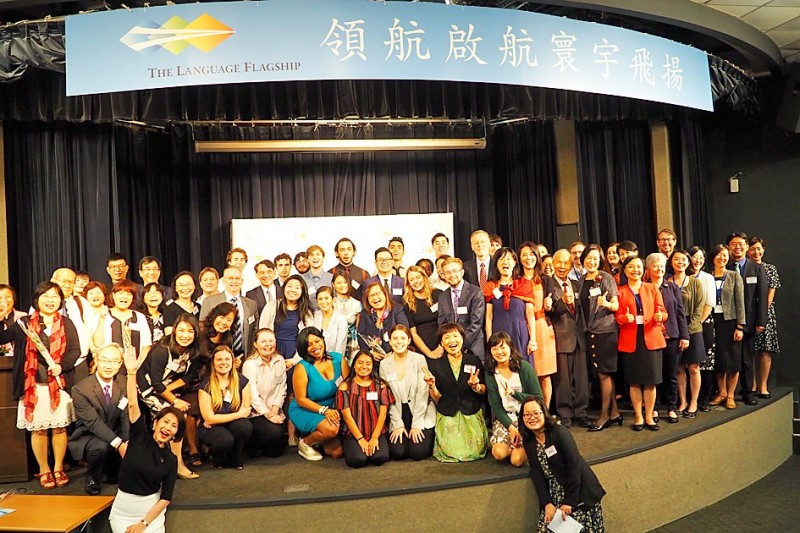《TAIPEI TIMES》 US-funded language program opens center at NTU

Students and teachers at the Chinese Overseas Flagship (COF) in Taiwan center yesterday pose with officials from the Ministry of Foreign Affairs and American Institute in Taiwan (AIT) at the official opening of the center at National Taiwan University in Taipei. AIT Director Brent Christensen is in the back row, with a red-striped tie; COF in Taiwan center director Chao Der-lin is seventh right in the front row in a red blazer. Photo courtesy of the Ministry of Education
/ Staff writer, with CNA
The Chinese Overseas Flagship (COF) in Taiwan center, part of the US government-sponsored Language Flagship program, officially opened yesterday at National Taiwan University (NTU) in Taipei.
The Language Flagship is an undergraduate program that includes instruction in languages such as Arabic, Korean, Persian, Portuguese, Russian and Turkish under the US’ National Security Education Program (NSEP).
The NSEP was established in 1991 under the David L. Boren National Security Education Act that mandated the US secretary of defense to create such a program to provide scholarships for undergraduates, fellowships to graduate students and grants to US institutions to fund the study of countries and languages critical to the US’ national security.
The COF in Taiwan center, which was established on June 3 and received its first batch of students last month, is one of two such centers in Asia; the other is at Nanjing University in China.
There had been one at Beijing Union University for several years, but the COF headquarters in the US is no longer using it for the capstone portion of the program, in which students who have completed four years of Chinese-language undergraduate courses take classes and intern in professional environments.
The Taipei center has 22 US students who have received scholarships of more than US$10,000 a year to study in Taiwan, center director Chao Der-lin (趙德麟) said at the opening ceremony.
Chao is a professor and head of the Chinese division at Hunter College in New York City as well as the director of that school’s Chinese Flagship center.
Hunter is one of the 12 universities that comprise the domestic Chinese Flagship in partnership with the US Department of Defense, and it has partnered with NTU to run the Taipei facility.
Aside from studying language and subjects related to their field of interest at NTU, the students will be able to intern at Taiwanese businesses and organizations, NTU said.
In a speech at the opening ceremony, American Institute in Taiwan Director Brent Christensen said that Taiwan is a good place to learn Chinese due to its safe environment, hospitable people and diverse culture.
Christensen encouraged the students to make the most out of their 10-month stay in Taiwan, saying that what he learned in Taiwan on his first overseas diplomatic assignment has helped his career.
Deputy Minister of Foreign Affairs Hsu Szu-chien (徐斯儉) said that the COF Taiwan Center is a milestone of US-Taiwan educational cooperation that symbolized strong Taiwan-US relations.
NTU already has a storied reputation for running intensive Mandarin language-training programs. Stanford University established a Mandarin training center on NTU’s campus in 1961, which two years later became the Inter-University Program (IUP) and over the next three decades set the standard for instruction in modern and classical Chinese.
In 1997, the US universities involved in the IUP moved the program to Tsinghua University in Beijing, while NTU assumed full administration for continuing the program on its campus, which it renamed the International Chinese Language Program.
新聞來源:TAIPEI TIMES
















